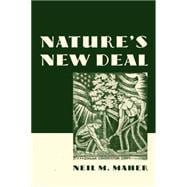
Note: Supplemental materials are not guaranteed with Rental or Used book purchases.
Purchase Benefits
What is included with this book?
| Introduction: New Deal Conservation | |
| Ideas: Franklin Roosevelt's Progressive Era Influences | |
| Landscapes: The Evolution of CCC Conservation | |
| Labor: Enrollee Work and the Body Politics | |
| Community: Locals and Next Door Natures | |
| Nation: The Great Conservation Debate | |
| Planning: From Top-Down Conservation to Bottom-Up Environment | |
| Epilogue: New Deal Landscapes in the Environmental Era | |
| Table of Contents provided by Publisher. All Rights Reserved. |
The New copy of this book will include any supplemental materials advertised. Please check the title of the book to determine if it should include any access cards, study guides, lab manuals, CDs, etc.
The Used, Rental and eBook copies of this book are not guaranteed to include any supplemental materials. Typically, only the book itself is included. This is true even if the title states it includes any access cards, study guides, lab manuals, CDs, etc.